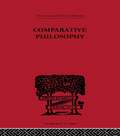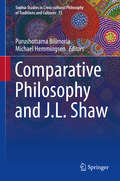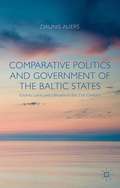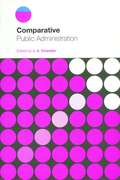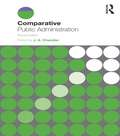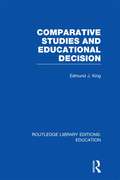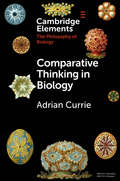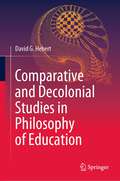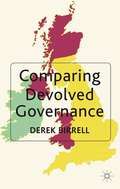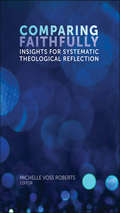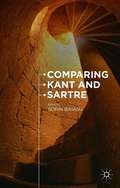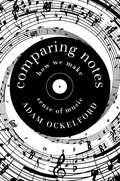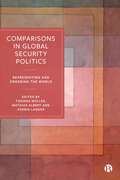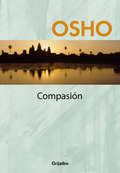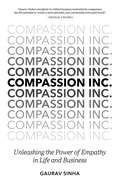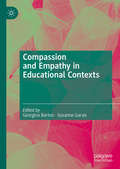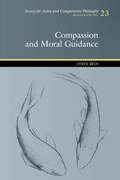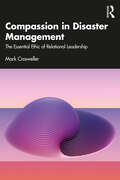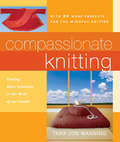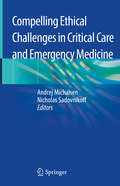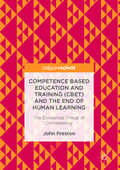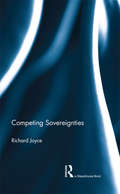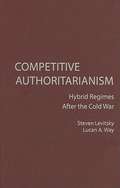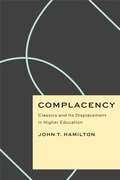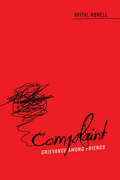- Table View
- List View
Comparative Philosophy (International Library of Philosophy #Vol. 4)
by Paul Masson-OurselFirst published in 2000. Routledge is an imprint of Taylor & Francis, an informa company.
Comparative Philosophy and J.L. Shaw (Sophia Studies in Cross-cultural Philosophy of Traditions and Cultures #13)
by Purushottama Bilimoria Michael HemmingsenAs a Festschrift, this book celebrates and honours the scholarly achievements of Professor Jaysankar Lal Shaw, one of the most eminent and internationally acclaimed comparative philosophers of our times. Original works by leading international philosophers and logicians are presented here, exploring themes such as: meaning, negation, perception and Indian and Buddhist systems of philosophy, especially Nyaya perspectives. Professor Shaw's untiring effort to solve some of the problems of contemporary philosophy of language, logic, epistemology, metaphysics and morals from the perspectives of classical Indian philosophers or systems of philosophy is deserving of a tribute. Chapters in this volume reflect the diverse aspects of Shaw's contribution to comparative philosophy and are organised into four sections: Language, Epistemology, Mathematics and Logic, Ethics and Politics. These chapters would appeal to anyone interested in philosophy or East-West thinking, including students and professionals. Graduates and researchers with interests in epistemology, metaphysics, political philosophy, logic and non-western philosophy will find this work highly relevant. Regarding the editors, Purushottama Bilimoria is a honorary professor at Deakin University and research fellow at the University of Melbourne in Australia, a Visiting Professor and Lecturer at University of California, Berkeley and Graduate Theological Union; Michael Hemmingsen is a PhD Candidate in the Department of Philosophy at McMaster University, Ontario, Canada.
Comparative Politics and Government of the Baltic States
by Daunis AuersComparative Politics and Government of the Baltic States provides an accessible, comprehensive and balanced comparative analysis of the political development and reinvention of Estonia, Latvia and Lithuania since seizing independence from a disintegrating Soviet Union in August 1991. Daunis Auers initially considers the political history of the region before focusing on the different constitutional and institutional choices made by Baltic leaders in the early 1990s. Auers compares constitutions, parliaments and executives as well as local governments, courts, bureaucracies and domestic security services. Other chapters analyse political parties and electoral systems, as well as the comparative development of civil society, the impact of corruption, and the political salience of latent ethnic tensions between titular-Russophone communities in Estonia and, especially, Latvia. The final chapters address economic, social and welfare developments as well as the Baltic states' cooperation in their common, crucial pursuit for external security.
Comparative Public Administration
by J. A. ChandlerThis accessible introduction to the system of public administration uses a clear, country by country analysis and includes new public management approaches. Including often neglected areas such as the European Union; Japan; Britain; France; Germany; The Republic of Ireland; Italy, Sweden and the United States, this student-friendly volume is a highly valuable resource for students of Politics and Administration at all levels.
Comparative Public Administration
by J. A. ChandlerThis accessible introduction to the system of public administration uses a clear, country by country analysis to the contemporary system of public administration and management in a number of significant countries. This text examines the extent to which new public management, politicians and public opinion can influence bureaucracies in various countries; in addition, it explores the role of public administration systems within the wider political systems and democratic frameworks of their states. The new edition revises and updates several of the original country studies including: the United States, France, the UK, the Republic of Ireland and Italy, and adds three more chapters on Greece, Russia, India and China. Each chapter is written to a common framework which makes comparison easier and covers the following issues: Political culture The Constitutional framework The civil service Public sector agencies Federal and local government Financing the system Co-ordination of the system Managing the system Accountability, secrecy and openness Democracy? Further developments and the financial crash This student-friendly volume is a highly valuable resource for students of Politics and Administration. This textbook is essential reading for students of comparative public administration.
Comparative Studies and Educational Decision (Routledge Library Editions: Education)
by Edmund J. KingThis volume offers a conceptual justification and methodology for comparative studies of education matching developments in the social sciences and other comparative disciplines. It also relates comparative studies of education to the practical business of policy formulation at all levels. Thus it bridges the widening gap between the purely academic world and the world of decision for development. The author draws illustrations from educational reforms, but goes further in suggesting suitable procedures or institutions which might achieve soundly based policies and secure their implementation. He takes account of the planning techniques and achievements of UNESCO, OECD and other international organizations, and examines the activities and aims of national planning for education in a wider perspective of world re-orientation.
Comparative Thinking in Biology (Elements in the Philosophy of Biology)
by Adrian CurrieBiologists often study living systems in light of their having evolved, of their being the products of various processes of heredity, adaptation, ancestry, and so on. In their investigations, then, biologists think comparatively: they situate lineages into models of those evolutionary processes, comparing their targets with ancestral relatives and with analogous evolutionary outcomes. This element characterizes this mode of investigation - 'comparative thinking' - and puts it to work in understanding why biological science takes the shape it does. Importantly, comparative thinking is local: what we can do with knowledge of a lineage is limited by the evolutionary processes into which it fits. In light of this analysis, the Element examines the experimental study of animal cognition, and macroevolutionary investigation of the 'shape of life', demonstrating the importance of comparative thinking in understanding both the power and limitations of biological knowledge.
Comparative and Decolonial Studies in Philosophy of Education
by David G. HebertThis book introduces the educational philosophies of notable African and Asian thinkers who tend to be little recognized in Europe and North America. It offers specific resources for diversification of higher education curricula. The book expands the philosophy of education, in clear language, to include ideas of major non-western educational thinkers who are little discussed in previous publications. It includes critical analysis of non-western concepts and consideration of their relevance to schools worldwide. The book features discussions of how the work of Tagore and postcolonial thinkers offers diverse visions that increasingly inspire a decolonizing approach to education. This book offers a unique emphasis on how a decolonized philosophy of education can especially enable a rethinking of approaches to education in arts and humanities subjects.
Comparing Devolved Governance
by Derek BirrellExamines recent evidence of a growing symmetry in the operation of devolution in Scotland, Wales and Northern Ireland. This book makes one of the first systematic and detailed comparisons of the operation of the devolved institutions and machinery of governance. It uses a comparative approach to explore the key workings of government.
Comparing Faithfully: Insights for Systematic Theological Reflection (Comparative Theology: Thinking Across Traditions)
by Michelle Voss Roberts, EditorEvery generation of theologians must respond to its context by rearticulating the central tenets of the faith. Interreligious comparison has been integral to this process from the start of the Christian tradition and is especially salient today. The emerging field of comparative theology, in which close study of another religious tradition yields new questions and categories for theological reflection in the scholar’s home tradition, embodies the ecumenical spirit of this moment. This discipline has the potential to enrich systematic theology and, by extension, theological education, at its foundations.The essays in Comparing Faithfully demonstrate that engagement with religious diversity need not be an afterthought in the study of Christian systematic theology; rather, it can be a way into systematic theological thinking. Each section invites students to test theological categories, to consider Christian doctrine in relation to specific comparisons, and to take up comparative study in their own contexts.This resource for pastors and theology students reconsiders five central doctrines of the Christian faith in light of focused interreligious investigations. The dialogical format of the book builds conversation about the doctrine of God, theodicy, humanity, Christology, and soteriology. Its comparative essays span examples from Hindu, Buddhist, Jewish, Muslim, Jain, and Confucian traditions as well as indigenous Aztec theology, and contemporary “spiritual but not religious” thought to offer exciting new perspectives on Christian doctrine.
Comparing Kant and Sartre
by Sorin BaiasuFor a long time, commentators viewed Sartre as one of Kant's significant twentieth-century critics. Recent research of their philosophies has discovered that Sartre's relation to Kant's work manifests an 'anxiety of influence', which masks more profound similarities. This volume of newly written comparative essays is the first edited collection on the philosophies of Kant and Sartre. The volume focuses on issues in metaphysics, metaethics and metaphilosophy, and explores the similarities and differences between the two authors, as well as the complementarity of some of their views, particularly on autonomy, happiness, self-consciousness, evil, temporality, imagination and the nature of philosophy.
Comparing Notes: How We Make Sense Of Music
by Adam OckelfordHow does music work? Indeed, what is (or isn’t) music? We are all instinctively musical, but why? Adam Ockelford has the answers. A tap of the foot, a rush of emotion, the urge to hum a tune; without instruction or training we all respond intuitively to music. Comparing Notes explores what music is, why all of us are musical, and how abstract patterns of sound that might not appear to mean anything can, in fact, be so meaningful. Taking the reader on a clear and compelling tour of major twentieth century musical theories, Professor Adam Ockelford arrives at his own important psychologically grounded theory of how music works. From pitch and rhythm to dynamics and timbre, he shows how all the elements of music cohere through the principle of imitation to create an abstract narrative in sound that we instinctively grasp, whether listening to Bach or the Beatles. Authoritative, engaging, and full of wonderful examples from across the musical spectrum, Comparing Notes is essential reading for anyone who’s ever loved a song, sonata, or symphony, and wondered why.
Comparisons in Global Security Politics: Representing and Ordering the World
by Steven Ward Anja P. Jakobi Christian Bueger Keith Krause Paul Beaumont Gabi Schlag Bastian Giegerich Hans-Joachim Schmidt Nike Retzmann Madeleine Myatt Paul Musgrave James Hackett Lena HerbstAvailable open access digitally under CC-BY-NC-ND licence. Comparative practices are integral to global security politics. The balance of power politics, status competitions and global security governance would not be possible without them. Yet, they are rarely treated as the main object of study. Exploring the varied uses of comparisons, this book addresses three key questions: • How is comparative knowledge produced? • How does it become politically relevant? • How do comparative practices shape security politics? This book takes a bold new step in uniting disparate streams of research to show how comparative practices order governance processes and modulate competitive dynamics in world politics.
Compasión
by Osho Osho«Compasión» es un término que se ha usado para describir una amplia gama de comportamientos y actitudes humanas, desde la misericordia hasta la piedad y la caridad. En este libro Osho examina la naturaleza de la compasión desde una perspectiva radicalmente distinta. Nos señala que la «pasión» se encuentra en la raíz de la palabra, y procede a examinar las hipótesis sobre el verdadero significado de aquel término. Muchos supuestos actos de compasión, dice él, están teñidos de un sutil sentimiento de autoimportancia o deseo de reconocimiento. Otros se sustentan no en el deseo de ayudar a los demás sino en el de obligarles a cambiar. Utilizando historias de la vida de Jesús, de Buda y del mundo del zen, Osho muestra cómo surge de nuestro interior el camino hacia la auténtica compasión, empezando por una profunda aceptación y amor por uno mismo. Solo entonces, dice Osho, puede florecer la compasión y convertirse en una fuerza sanadora, arraigadaen la aceptación incondicional del otro tal y como es.
Compassion Inc.: Unleashing the Power of Empathy in Life and Business
by Gaurav SinhaBe inspired to transform your business to change the world.Do you ever wonder how successful businesses can be used as a force for good? Do you sometimes feel conflicted by the principles of capitalism? Do you wish to change the world around you whilst doing what you love?In this book, Gaurav Sinha, world-class businessman and entrepreneur, founder of Insignia in 2003, outlines the economics of empathy for life and for business. He offers actionable solutions to maintaining a successful trade in a changing global landscape where conscience, ethics, and authenticity are high on the agenda.The world is changing, perceptions are shifting, consumers are evolving, and this book will ensure your business keeps up.
Compassion and Empathy in Educational Contexts
by Susanne Garvis Georgina BartonThis book explores the importance of compassion and empathy within educational contexts. While compassion and empathy are widely recognised as key to living a happy and healthy life, there is little written about how these qualities can be taught to children and young people, or how teachers can model these traits in their own practice. This book shares several models of compassion and empathy that can be implemented in schooling contexts, also examining how these qualities are presented in children’s picture books, films and games. The editors and contributors share personal insights and practical approaches to improve both awareness and use of compassionate and empathetic approaches to others. This book will be of interest and value to all those interested in promoting compassion and empathy within education.
Compassion and Moral Guidance
by Steve BeinCompassion is a word we use frequently but rarely precisely. One reason we lack a philosophically precise understanding of compassion is that moral philosophers today give it virtually no attention. Indeed, in the predominant ethical traditions of the West (deontology, consequentialism, virtue ethics), compassion tends to be either passed over without remark or explicitly dismissed as irrelevant. And yet in the predominant ethical traditions of Asia, compassion is centrally important: All else revolves around it. This is clearly the case in Buddhist ethics, and compassion plays a similarly indispensable role in Confucian and Daoist ethics. In Compassion and Moral Guidance, Steve Bein seeks to explain why compassion plays such a substantial role in the moral philosophies of East Asia and an insignificant one in those of Europe and the West. The book opens with detailed surveys of compassion’s position in the philosophical works of both traditions. The surveys culminate in an analysis of the conceptions of self and why the differences between these conceptions serve either to celebrate or marginalize the importance of compassion.
Compassion in Disaster Management: The Essential Ethic of Relational Leadership
by Mark CroswellerShould leadership minimise suffering? This book argues yes: offering leaders, especially those in disaster management, a way to improve their ability to lead, serve, and protect others during disasters and crises.Drawing upon his own experiences as a disaster management specialist as well as high-level interviews with disaster management leaders from the USA, Australia and New Zealand, Crosweller bridges theory and practice to achieve three objectives. Firstly, to establish the political and socio-cultural context in which disaster management leaders find themselves when seeking to protect citizens and minimise their suffering and vulnerability. Secondly, to provide an empirical account of how certain sociocultural influences affect their efficacy as leaders and that of their organisations, when seeking to improve well-being, provide protection, and reduce suffering and vulnerability. Third, to propose a relational leadership framework centred upon an ethic of compassion, and supported by behaviours, characteristics, and practices that can guide leaders when addressing the causes of suffering and vulnerability across the entire disaster management cycle. This framework progressively emerges as the reader navigates their way through each chapter.An essential text for aspiring and experienced leaders, especially those in the fields of Emergency Medical Services, fire services, law enforcement, and emergency management. It will also appeal to students and researchers in related disciplines.
Compassionate Knitting
by Tara Jon ManningCompassionate Knitting: Finding Basic Goodness in the Work of Our Hands is a knitting book unlike any other. The 20 original-design projects included in this book range from small accessory items and gifts to wearable garments-all of which include personal ritual in their creation or use. Each project is inspired by an element of the world around us, based on a contemplative theme drawn from Shambhala Buddhism and Eastern arts or, in some cases, Western notions of the magical and mindful.
Compelling Ethical Challenges in Critical Care and Emergency Medicine
by Andrej Michalsen Nicholas SadovnikoffThis book addresses the ethical problems that physicians have to face every day while caring for critically ill patients. Advances in medical technology, ageing societies worldwide, and their increased demands on health care systems have, on the one hand, led to better care and remarkable longevity in many parts of the world. On the other hand, however, improved treatments in many medical fields, amongst others in emergency and critical care, have resulted in more patients surviving with reduced quality of life. This entails tradeoffs for many patients, their families, and the teams caring for them. At the same time, health care expenditures have risen dramatically and have to be balanced against costs for other public goods. Finally, the humane aspects of care have often failed to keep pace with the remarkable technological strides made in recent years.In this book, experts in their respective fields describe compelling ethical challenges resulting from these discrepancies and discuss potential solutions. The book is primarily intended for clinicians who care for two of the most vulnerable patient subpopulations – those being treated in ambulances or emergency rooms, and those being treated at intensive care units – due in part to the fact that they may be temporarily or permanently incapacitated. Core medical skills, such as diagnosis and predicting outcomes, as well as implementing treatment, remain challenging. However, without adequate communication and collaboration both within the inter-professional treatment teams and between the teams and the patients/their families, delivering excellent care is difficult at best. Therefore, the so-called “soft skills” are given the attention they deserve in order to overcome the gap between technological progress and interpersonal standstill.
Competence Based Education and Training (CBET) and the End of Human Learning: The Existential Threat of Competency
by John PrestonThis book radically counters the optimism sparked by Competence Based Education and Training, an educational philosophy that has re-emerged in Schooling, Vocational and Higher Education in the last decade. CBET supposedly offers a new type of learning that will lead to skilled employment; here, Preston instead presents the competency movement as one which makes the concept of human learning redundant. Starting with its origins in Taylorism, the slaughterhouse and radical behaviourism, the book charts the history of competency education to its position as a global phenomenon today, arguing that competency is opposed to ideas of process, causality and analog human movement that are fundamental to human learning.
Competing Sovereignties
by Richard JoyceCompeting Sovereignties provides a critique of the concept of sovereignty in modernity in light of claims to determine the content of law at the international, national and local levels. In an argument that is illustrated through an analysis of debates over the control of intellectual property law in India, Richard Joyce considers how economic globalization and the claims of indigenous communities do not just challenge national sovereignty - as if national sovereignty is the only kind of sovereignty - but in fact invite us to challenge our conception of what sovereignty ‘is’. Combining theoretical research and reflection with an analysis of the legal, institutional and political context in which sovereignties 'compete', the book offers a reconception of modern sovereignty - and, with it, a new appreciation of the complex issues surrounding the relationship between international organisations, nation states and local and indigenous communities.
Competitive Authoritarianism: Hybrid Regimes After the Cold War
by Steven Levitsky Lucan A. WayBased on a detailed study of 35 cases in Africa, Asia, Latin America, and post-communist Eurasia, this book explores the fate of competitive authoritarian regimes between 1990 and 2008. It finds that where social, economic, and technocratic ties to the West were extensive, as in Eastern Europe and the Americas, the external cost of abuse led incumbents to cede power rather than crack down, which led to democratization. Where ties to the West were limited, external democratizing pressure was weaker and countries rarely democratized. In these cases, regime outcomes hinged on the character of state and ruling party organizations. Where incumbents possessed developed and cohesive coercive party structures, they could thwart opposition challenges, and competitive authoritarian regimes survived; where incumbents lacked such organizational tools, regimes were unstable but rarely democratized.
Complacency: Classics and Its Displacement in Higher Education (Critical Antiquities)
by John T. HamiltonA critical reflection on complacency and its role in the decline of classics in the academy. In response to philosopher Simon Blackburn’s portrayal of complacency as a vice that impairs university study at its core, John T. Hamilton examines the history of complacency in classics and its implications for our contemporary moment. The subjects, philosophies, and literatures of ancient Greece and Rome were once treated as the foundation of learning, with everything else devolving from them. Hamilton investigates what this model of superiority, derived from the golden age of the classical tradition, shares with the current hegemony of mathematics and the natural sciences. He considers how the qualitative methods of classics relate to the quantitative positivism of big data, statistical reasoning, and presumably neutral abstraction, which often dismiss humanist subjectivity, legitimize self-sufficiency, and promote a fresh brand of academic complacency. In acknowledging the reduced status of classics in higher education today, he questions how scholarly striation and stagnation continue to bolster personal, ethical, and political complacency in our present era.
Complaint: Grievance among Friends
by Avital Ronell"It is not, nor it cannot come to good. But break, my heart, for I must hold my tongue." Thus spoke Hamlet, one of the great kvetchers of literature. Every day, gripers challenge our patience and compassion. Yet Pollyannas rile us up with their grotesque contentment and unfathomable rejection of protest. Avital Ronell considers how literature and philosophy treat bellyachers, wailers, and grumps--and the complaints they lavish on the rest of us. Combining her trademark jazzy panache with a fearless range of readings, Ronell opens a dialog with readers that discusses thinkers with whom she has directly engaged. Beginning with Hamlet, and with a candid awareness of her own experiences, Ronell proceeds to show how complaining is aggravated, distracted, stifled, and transformed. She moves on to the exemplary complaints of Friedrich Nietzsche, Hannah Arendt, and Barbara Johnson and examines the complaint-riven history of deconstruction. Infused with the author's trademark wit, Complaint takes friends, colleagues, and all of us on a courageous philosophical journey.
